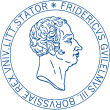Friedrich Marx (philologist)
Friedrich Marx (born April 22, 1859 in Bessungen , today in Darmstadt , † October 17, 1941 in Bonn ) was a German classical philologist .
Life
Friedrich Marx, the nephew of the architecture professor Erwin Marx (1841–1901), studied classical philology from 1877 to 1882 at the universities of Giessen and Bonn , where his most important teachers were Franz Bücheler and Hermann Usener . In 1882 he received his doctorate in Bonn with the dissertation Studia Luciliana . He achieved his habilitation in 1887 in Berlin with Johannes Vahlen . In the following decades he worked for a few years as a full professor at various universities: from 1888 to 1889 in Rostock (predecessor Friedrich Leo , successor Richard Reitzenstein ), from 1889 to 1893 in Greifswald (predecessor Adolph Kießling , successor Eduard Norden ), from 1893 to 1896 in Breslau (predecessor Martin Hertz , successor Franz Skutsch ), from 1896 to 1899 in Vienna (predecessor Wilhelm von Hartel , successor Edmund Hauler ), where he was also elected a corresponding member of the Academy of Sciences in 1898 , from 1899 to 1906 in Leipzig (predecessor Otto Ribbeck , successor Richard Heinze ). In 1905 he accepted an offer at the University of Bonn to the chair of his teacher Bücheler, which he followed in 1906. Marx stayed here until his retirement, which took place after the summer semester of 1927. In the academic year 1917/1918 he was rector of the university.
Services
Friedrich Marx is considered to be the last representative of the Bonn school of classical philology, as it was founded by Friedrich Ritschl in the 1840s. Like this and his successor Franz Bücheler, Marx understood exegesis and textual criticism as an essential task of philology, while the Leipzig School around Richard Heinze and the Berlin School around Hermann Diels and Werner Jaeger had long sought to anchor the history of ideas and philosophy in philology. In doing so, Marx was critical of the linguistic investigations of his Breslau successor Franz Skutsch on the ancient Latin texts.
However, his conservative stance did not prevent him from creating significant text editions and commentaries that are widely used to this day. These include his critical edition of the Rhetorica ad Herennium (1894, reprinted 1964, 1966 and 1993), the fragments of the satirist Lucilius (two volumes, 1894–1895), the Diversarum hereseon liber by Filastrius of Brescia ( CSEL 1898), the writings of Celsus (1915) and the Plautinian row (1928).
From 1925 to 1934 Marx was editor of the journal Rheinisches Museum für Philologie , which had previously been idle since 1920 due to the long illness of the publisher August Brinkmann . His successor from Bonn, Ernst Bickel, took over the editorial work in 1935 until the magazine was discontinued due to the war in 1944 and re-founded it in 1950.
For health reasons, Marx had to limit his scientific work from 1935. He died on October 17, 1941 at the age of 82. He was given a grave of honor in the Poppelsdorf cemetery .
literature
- Academy of Sciences in Vienna. Almanac for 1942. Volume 92, 1942, pp. 280–286.
- Ernst Bickel : Friedrich Marx †. In: Gnomon . Volume 18, 1942, pp. 122-124.
- Hans Herter : Classical Philology since Usener and Bücheler. In: Bonn scholars. Philosophy and Classical Studies. Bonn 1968, pp. 165–211 (on Marx especially pp. 197–201, with picture).
- Angelika Lozar: Marx, Friedrich. In: Peter Kuhlmann , Helmuth Schneider (Hrsg.): History of the ancient sciences. Biographical Lexicon (= The New Pauly . Supplements. Volume 6). Metzler, Stuttgart / Weimar 2012, ISBN 978-3-476-02033-8 , Col. 788 f.
Web links
- Literature by and about Friedrich Marx in the catalog of the German National Library
- Entry on Friedrich Marx in the Catalogus Professorum Rostochiensium
- Overview of the lectures of Friedrich Marx (philologist) at the University of Leipzig (summer semester 1899 to summer semester 1906)
Individual evidence
- ^ Ernst Bickel : Friedrich Marx †. In: Gnomon. Volume 18, 1942, pp. 122-124, here p. 124.
- ↑ Auli Cornelii Celsi quae supersunt. Teubner, Leipzig (and Berlin) 1915 (= Corpus medicorum graecorum , 1).
| personal data | |
|---|---|
| SURNAME | Marx, Friedrich |
| ALTERNATIVE NAMES | Marx, Johann David Friedrich Wilhelm |
| BRIEF DESCRIPTION | German classical philologist |
| DATE OF BIRTH | April 22, 1859 |
| PLACE OF BIRTH | Qualifications |
| DATE OF DEATH | October 17, 1941 |
| Place of death | Bonn |



